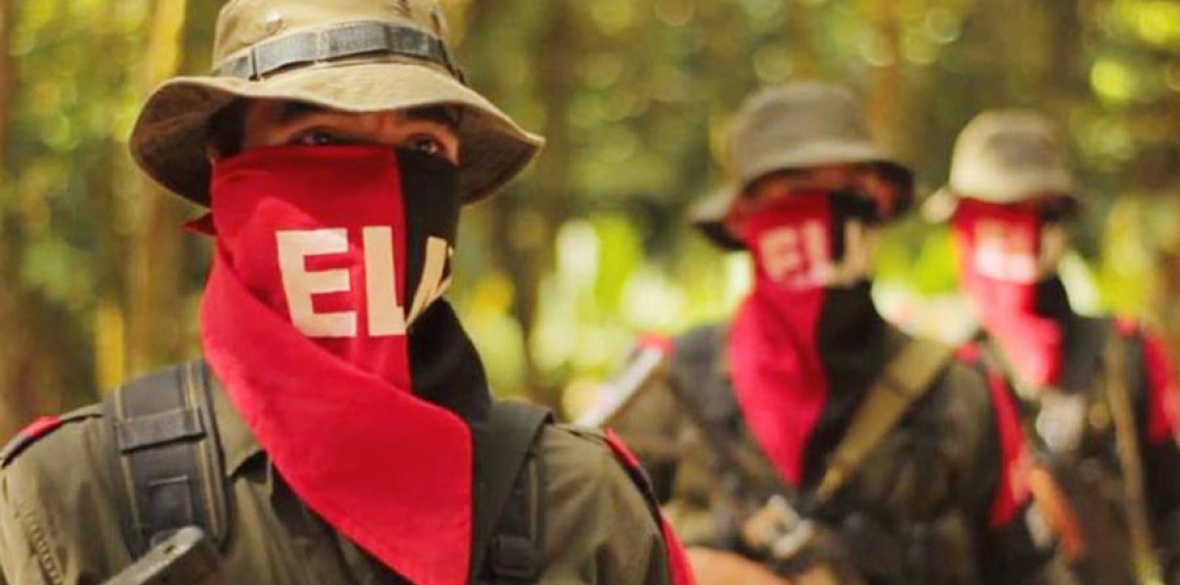This is the last article you can read this month
You can read more article this month
You can read more articles this month
Sorry your limit is up for this month
Reset on:
Please help support the Morning Star by subscribing here
FOR 72 hours in February, transport and industry across Colombia was severely impaired as militants lent the weight of their weapons to anti-neoliberal protesters.
Causing massive damage to capitalist accumulation, uniquely, the ELN’s aim was to persuade Colombia’s government and dominant classes to negotiate not with the insurgents themselves but with the labour movement.
Conceiving itself as an “armed resistance” rather than as a traditional, formal guerilla army oriented to taking power militarily, the ELN is not a typical armed socialist movement.
The ELN is a federalised organisation made up of trade union and social movement structures, in addition to armed “guerilla” units: the combination of these civilian and armed structures determines the leadership of the ELN, which is elected at national congresses.
Sections of the labour and social movement, therefore, have called for political-military support from the ELN in their struggles with neoliberal conditions — and the ELN responded by imposing its “armed strike.”
This essentially shut down economic activity between regions and primarily targeted transnational companies in an effort to the right-wing government to compromise politically with the demands of labour and the recent demonstrators.
Transport between regions was particularly targeted, alongside the economic infrastructure of extractive multinationals such as oil pipelines and mining operations.
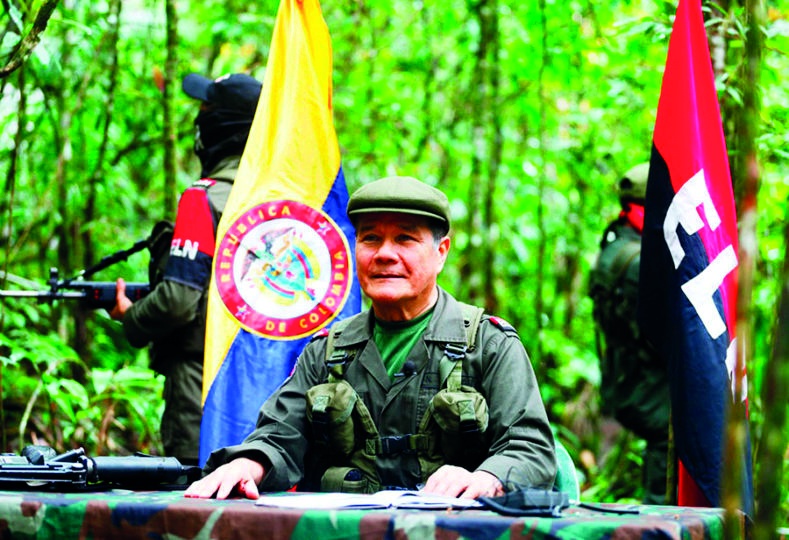
Movements of such economic operations in various areas was brought to a standstill, especially affecting Occidental Petroleum’s trade routes.
The US multinational is heavily invested in Colombian oil production and even benefits from military task forces strictly designated to protect its investments.
In an official statement issued in advance of the “armed strike” the ELN clarified that “populations can remain in their homes and workplaces, such as farms, workshops and other spaces, but populations should not engage in land, river and air transport.”
The statement went on to say that during the “armed strike,” from 6am on Friday February 14 until 6am on Monday February 17, that “the right to transport patients requiring hospital treatment, as well as the movement of relatives to attend funeral matters, will be respected.”
According to the governments of Colombia, the United States and Britain, it is considered a “terrorist offence” to target private property as part of a political-military strategy — although the ELN is not currently listed as a terrorist organisation by the British government.
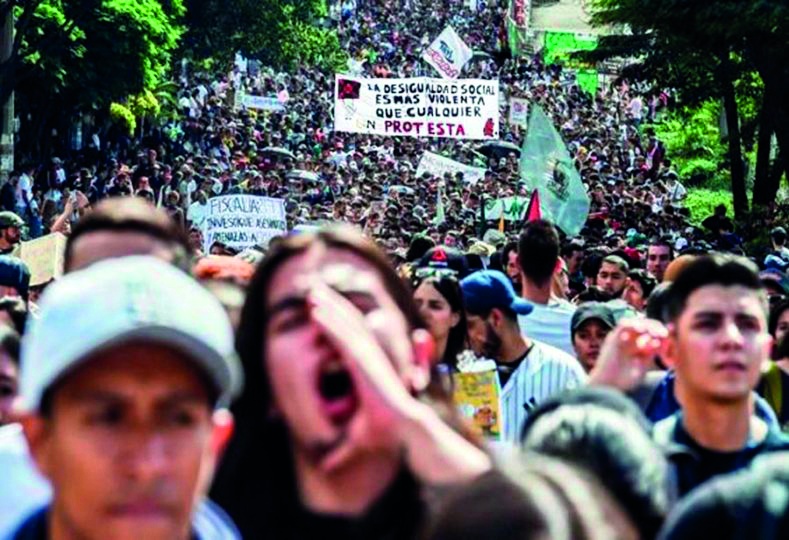
The recent anti-government, anti-neoliberal demonstrations — and the state’s repressive response — influenced the ELN’s co-ordination of the extraordinary “armed strike.”
Taking place from November 2019 and initially called by the trade union movement, the demonstrations gained the broad support of various sectors of civil society — indigenous groups, students, rights and peace activists alongside farmers and workers.
The demonstrations were overwhelmingly supported by Colombia’s left-wing political parties and grassroots social movements.
But the demonstrations were faced with exceptionally brutal state repression, even by Colombian standards. The right-wing government sent in almost 15,000 military soldiers to “manage” the demonstrators.
And according to the Colombia Reports news service, police statistics show that almost 12,000 activists were detained by police in Bogota alone in November and December 2019.
Reports of the torturing of demonstrators have been widespread.
Even Human Rights Watch, an organisation linked to US foreign policy ambitions, said of the recent demonstrations: “The Colombian national police, in a number of instances, abused the mostly peaceful demonstrators protesting throughout the country in late 2019 [and] efforts to ensure accountability have been limited.”
Jose Miguel Vivanco, the organisation’s Americas director, said: “We have gathered worrying accounts and evidence of abuses by Colombia’s police, including arbitrary detention and brutal beatings against peaceful protesters, detainees and bystanders.”
And in a “technical error” recently, Colombia’s armed forces accidentally published a list on Twitter labelled as “the opposition” made up of critical journalists, left-wing politicians, ex-Farc guerillas, trade unionists and rights activists.
The list shows once again that not simply “insurgents” but rather the left in general is the intended target of Colombia’s US-sponsored counter-insurgency strategy.
In addition to austerity, privatisation and transnational capitalist exploitation of the environment, many of the recent demonstrators are angry that Colombia’s 2016 peace agreement, which the government signed with the Farc — a political-military organisation that is now a legal political party fielding candidates in elections — is not being implemented and protected by the government.
Instead, capitalist-sponsored killings of demobilised and now unarmed Farc members are continuing to rise and assassinations of social activists have actually increased since the peace agreement was signed in late 2016.
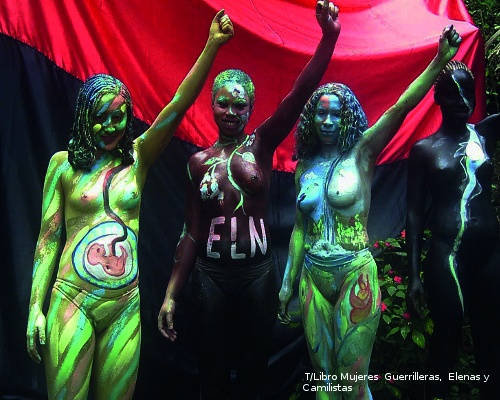
According to figures recently released by the British-based organisation Justice for Colombia, almost 200 former Farc insurgents and almost 600 social movement activists have been assassinated since the signing of the November 2016 peace agreement.
Meanwhile, although unreported by Colombia’s corporate media and government, ELN guerilla forces continue to face exceptionally intense counterinsurgency measures in the east, along the border with Venezuela.
The ELN’s territory in such strategically located regions such as Arauca and North Santander serves as a corridor preventing outright aggression from Colombia’s armed forces into Venezuela’s territory.
The ELN’s presence and influence in such territories would severely hamper conventional military operations against Venezuela.
By corporate media outlets and policymakers, the ELN is portrayed as the indisputable aggressor and the Colombian state as the passive victim.
But in reality, according to my sources familiar with the (counter)insurgency on the Colombia-Venezuela border, scores of influential ELN militants have been covertly targeted by the state recently.
These killings and arrests have not been publicised, either in the media or by Colombia’s military and government.
A tactic with a long history, civilian police and intelligence officers have been discretely inserted into ELN strongholds to undermine its political structures, especially its “commissions” — politically oriented structures specifically assigned to maintain rebel social order and address local working-class grievances.
Moreover, trade unionists and social activists, many of whom have represented the ELN as part of its federal structures during recent peace talks, have been arrested and told that they will not be released until the ELN gives up its weapons.
The ELN’s mediator of peace negotiations, Juan Carlos Cuellar, an urban-based activist affiliated with Colombia’s labour movement, was arrested in December 2019. His imprisonment was not disclosed by Colombia’s government.
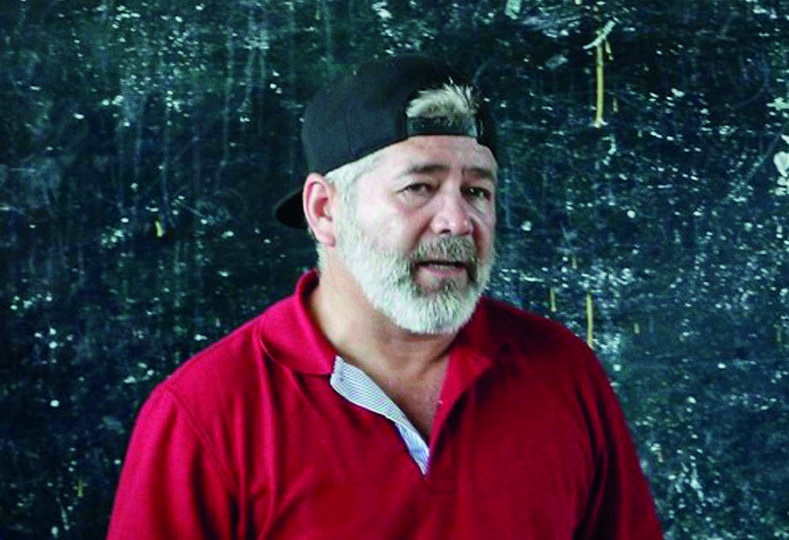
This contrasts with the barrage of public “victory statements” that usually follow when left-wing insurgents are successfully killed or captured.
Concealment of the peace mediator’s imprisonment is likely due to the fact that the government does not want to be seen as overly hostile to peace negotiations in a climate where many are becoming increasingly agitated by the government’s perceived lack of commitment to peace.
The ELN’s most important negotiators and political leaders, who were in Cuba as part of previous peace talks that collapsed in 2019, have been prevented from returning to Colombia.
Offering them no advanced warning, Colombia reactivated an Interpol arrest warrant for the negotiators the moment the government decided to cancel the talks.
The state’s aggressive manoeuvres take place covertly, in more isolated and impoverished regions along the border with Venezuela, so are easily overlooked, while its peace negotiations are well-publicised.
This has meant the media generally sees the ELN as being principally responsible for the failure of peace talks and the escalation of violence.
However, the public’s perception is changing and its patience is running out now that the government has frustrated the unarmed political protest movement that began in 2019.
It is in this context that the ELN was able lay the groundwork for the unprecedented “armed strike,” shaking the Colombian state to its core.
Oliver Dodd is a PhD candidate at Nottingham University and has spent five months of ethnographic research observing ELN units as part of his research on Colombia’s armed conflict and peace-making experiences.
His blog can be found at colombianconflict.com.

